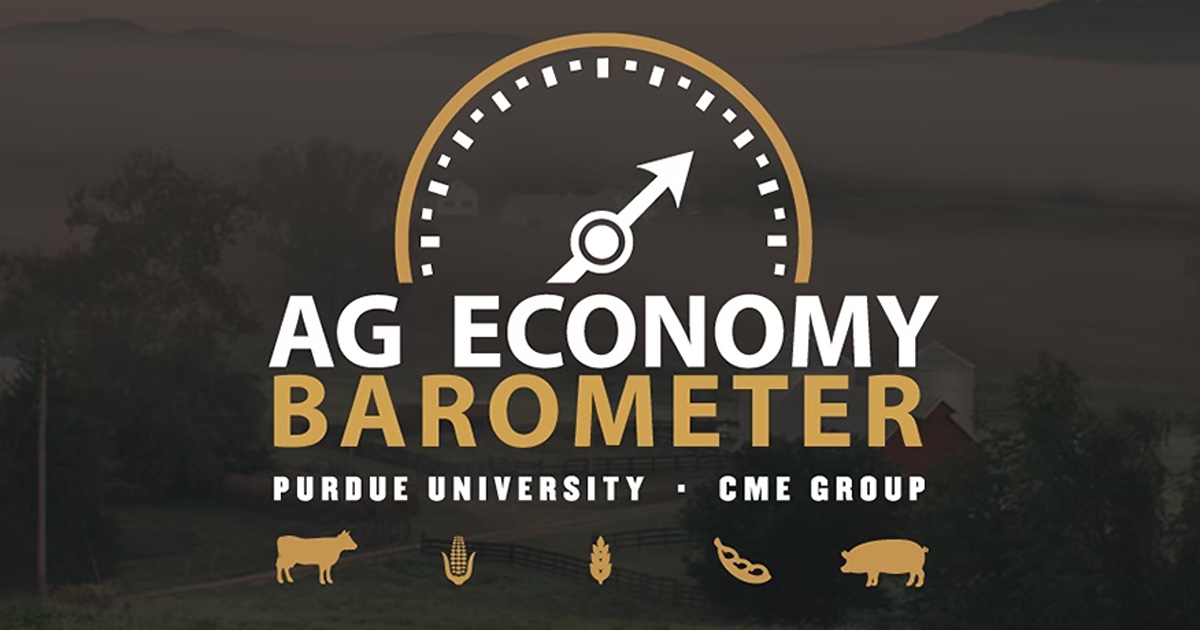The College of Agriculture welcomes 11 new faculty members
Lourival Monaco, research assistant professor in digital innovation entrepreneurship, Agricultural Economics
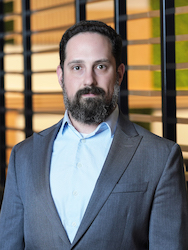
Lourival Monaco has been appointed to the position of research assistant professor in digital innovation entrepreneurship, following his role as a postdoctoral research associate in the Center for Food and Agricultural Business. At the Digital Innovation in Agri-Foods Systems Lab (DIAL Ventures), Monaco focuses on identifying obstacles within the agricultural and food value chain and creating solutions to these challenges through collaborations with entrepreneurs and startup businesses. Born and raised in Brazil, Monaco earned a bachelor's degree in agronomic engineering, an MBA in agribusiness, an M.S. in agronomy and a Ph.D. in business administration from the University of São Paulo. During his Ph.D. studies, Monaco completed an international residency program at Purdue University in 2017, which deepened his ties to the Boilermaker community and ignited a passion for barbecuing.
Maksym Chepeliev, research assistant professor in global economic analysis, agricultural economics
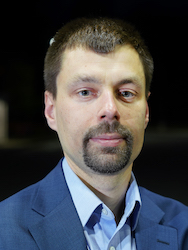
Maksym Chepeliev, formerly a principal research economist in the Center for Global Trade Analysis, joins the Department of Agricultural Economics as a research assistant professor in global economic analysis. His work encompasses a wide range of global and regional economic issues, including agricultural policies, climate change mitigation, circular economy, multilateral trade agreements, geopolitical disruptions and energy transition.Chepeliev specializes in quantitative analysis of international policy using applied general equilibrium, integrated assessment and energy system models. In his new role, Chepeliev seeks to lead a national and international research program that addresses issues of environmental and resource economics while focusing on global challenges such as climate mitigation, efficient resource use, circularity and income distribution. Additionally, Chepeliev is a competitive ultra-runner, regularly participating in 50k and 50m races.
Yaguang Zhang, clinical assistant professor of online education in digital agriculture, agricultural and biological engineering and agricultural sciences education and communication
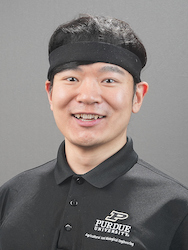
Yaguang Zhang, a recent addition to the agricultural and biological engineering and agricultural sciences education and communication departments, holds a bachelor's degree in communication engineering from Tianjin University and a master's degree and Ph.D. in electrical and computer engineering from Purdue University. During his postdoctoral years, Zhang immersed himself in the U.S. educational system, focusing on the crucial role education plays in shaping lives. His research at the Open Ag Technology and Systems Center focuses on rural area development, addressing key issues that hinder equal access to modern technology. Specifically, his work revolves around data collection, telecommunications, and data analysis. With a personal goal of creating a better world and fostering altruism through education, Zhang creates and gives drawings, paintings and song covers online to help individuals navigate personal challenges.
Tesfaye Tesso, professor of international plant breeding, agronomy
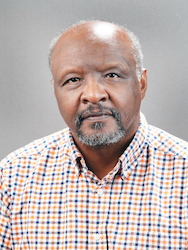
Tesfaye Tesso joins the agronomy department from Kansas State University, where he was professor of plant breeding and genetics and led the university sorghum breeding program. His research focuses on improving yield potential through manipulating plant architecture, drought tolerance and the nutritional quality of sorghum to bridge technology gaps in the sorghum industry. Tesso collaborates on a global scale to improve sorghum hybrids for the U.S. sorghum belt and specialty food applications. He plans to leverage these experiences to strengthen partnerships and enhance the resilience, productivity and nutrition of key food security crops for smallholder farmers in developing countries. Beyond his genetic research, Tesso enjoys playing volleyball and soccer with his family.
Casie Bass, clinical assistant professor, animal sciences
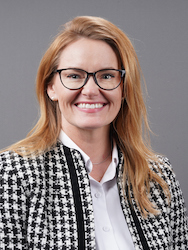
Casie Bass, a new addition to the animal sciences department, holds bachelor's and master's degrees in animal science from Southern Illinois University. After graduating, she conducted research on animal reproduction in Fortaleza, Brazil. With a Ph.D. in animal science from North Dakota State University, specializing in equine science and reproductive physiology, Bass focused her doctoral research on arginine supplementation's nutritional effects on angiogenesis within the corpora lutea in reproductively sound sheep. At the University of Wisconsin-River Falls, she managed the equine breeding program, coached the horse judging team and advised the Association of Women in Agriculture for students. In her new role, Bass will work with undergraduate students and be involved with Purdue Extension activities, including mentoring high school students and judging horse events. In addition to her passion for animal sciences, Bass enjoys running, cycling, horseback riding and remodeling her home.
Heather Neave, assistant professor of applied ethology, Animal Sciences
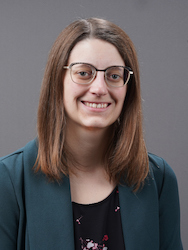
Heather Neave comes to the Department of Animal Sciences with a bachelor's degree in biology from University of Victoria and a master's and Ph.D. in applied animal biology specializing in animal welfare from University of British Columbia. Her postdoctoral research focused on the automated assessment of pasture-based dairy cattle behavior and alternative management systems for cows and calves, spanning global regions including Canada, New Zealand and Denmark. Neave's commitment to promoting positive animal welfare in intensive commercial systems is evident in her exploration of sustainable solutions within the livestock industry, particularly dairy cattle. Her work has also emphasized understanding the emotional states, cognitive abilities and personalities of dairy animals. As assistant professor of applied ethology, she provides mentorship for undergraduate and graduates, the next generation of animal behavior and welfare scientists. Outside of work, Neave can be found skiing in the mountains and traveling to new destinations.
Tingting Ju, assistant professor of microbiome and antimicrobial resistance, Animal Sciences
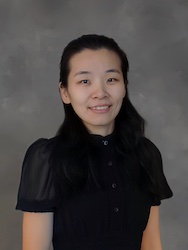
Tingting Ju joins the animal sciences department as assistant professor of microbiome and antimicrobial resistance. With a Ph.D. in animal science and postdoctoral research training from the University of Alberta, she focuses on understanding the relationship between gut commensal microbes and host physiology, considering various nutritional, managerial and processing strategies. Ju's passion lies in enhancing livestock production and animal health, as well as the role of commensal bacteria in the physiological, immunological and nutritional states of the host. Through collaboration with the scientific community, involving model development and multi-omics approaches, Ju's work has contributed valuable insights to the fields of nutrition, intestinal health and antibiotic resistance. Outside of animal sciences, Ju enjoys outdoor activities, including mountain biking and hiking.
Ben Carter, assistant clinical professor, biochemistry
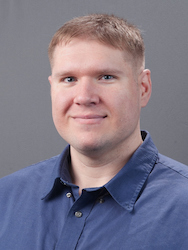
Ben Carter has been appointed to the position of assistant clinical professor in the Department of Biochemistry. After working as an analytical chemist with a bachelor's degree in chemistry from IUPUI, he pursued a Ph.D. in biochemistry at Purdue University followed by a postdoctoral at the National Heart, Lung, and Blood Institute. Carter's research focuses on epigenomic contributions to development and disease as well as developing new methods for genome-wide profiling of epigenetic marks. In his new role, Carter not only teaches and mentors students, but also participates in collaborative research projects using his expertise in genomics. Beyond his life-science research, Carter enjoys weightlifting, basketball, coding and video games and is passionate about increasing STEM access for underprivileged students.
Leon Robert, Jr., professor of practice (dual appointment), Chemical engineering and Entomology
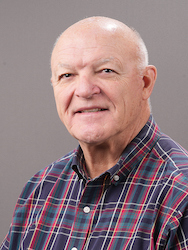
After being a contractor for Chevron in the oil and gas business and a consultant for the Purdue Military Research Institute and the Davidson School of Chemical Engineering, Leon Robert Jr. now holds a dual appointment as professor of engineering practice in chemical engineering and as professor of clinical practice in the Department of Entomology. Robert has earned a bachelor's degree in biology and an M.Ed. in science education from State University of New York at Potsdam, M.S. in biology from Old Dominion University, M.S.S. in strategic studies from the U.S. Army War College and Ph.D. in entomology from Texas A&M University. Following a 31-year army career, Robert retired as professor emeritus from the United States Military Academy. His research focuses on energetic materials production and the control of vector-borne diseases, contributing insights to both military and civilian sectors. Demonstrating his commitment to sustainable innovation and public health, Robert extends his efforts to environmental conservation on his ranch in Texas. There, he works toward reestablishing natural grasses to support the habitat of native quail in the Texas Panhandle. Having explored 62 different countries, he has also developed a passion for travel.
Jianmin Wang, research assistant professor of digital forestry, forestry and natural resources
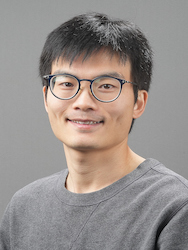
Jianmin Wang, former postdoctoral research associate in the Department of Forestry and Natural Resources, has transitioned into the role of research assistant professor of digital forestry. He holds a bachelor's degree in physics, M.E. in geographic information systems from Beijing Normal University and a Ph.D. in geospatial science and engineering from South Dakota State University. His research focuses on forest responses such as tree species shift and phenological changes to climate disturbances using remote sensing and field surveys. Wang has previously taught remote sensing, geospatial modeling and geographic information systems. During his free time, he enjoys fishing and playing badminton.
Tyler Hoskins, research assistant professor, forestry and natural resources
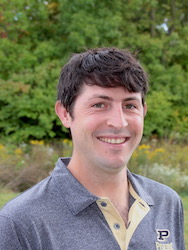
Tyler Hoskins, newly appointed research assistant professor for the Department of Forestry and Natural Resources, works part time for the Institute for a Sustainable Future to support research and outreach for the Per- and Polyfluorinated Substance (PFAS) Strategic Research Team. He completed his bachelor's in biology from Butler University and earned a Ph.D. in ecology, evolution and environmental biology from Miami University, where he studied effects of an endocrine disrupting herbicide on amphibians across various ecological contexts. Hoskins came to Purdue in 2019 for his postdoctoral research and focused on understanding bioaccumulation and the effects of PFAS on amphibians and aquatic communities. With expertise in ecotoxicology and environmental science, his current work is aimed at understanding how common agricultural practices might introduce PFAS into ponds, where they could affect not only wildlife, but also humans consuming fish from PFAS contaminated waters. In his new role, Hoskins will continue his research on PFAS bioaccumulation and mentor students in a collaborative atmosphere. He hopes his research can improve environmental health in Indiana and beyond. Outside of work, Hoskins finds joy in family moments with his two-year-old son and fishing Indiana's beautiful waterways.





